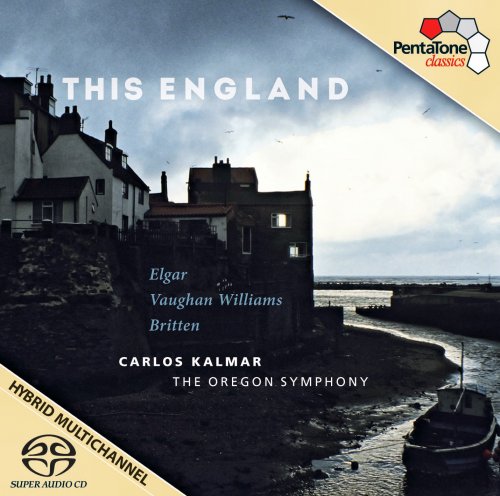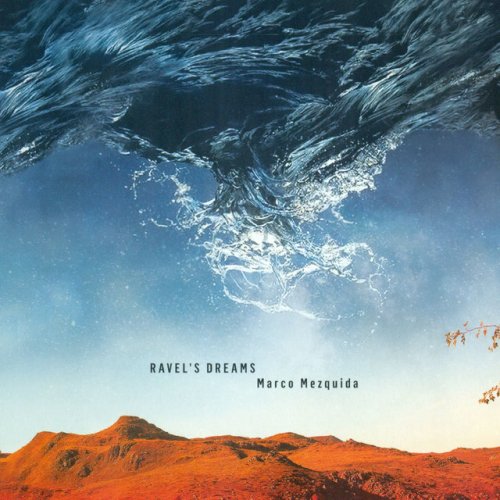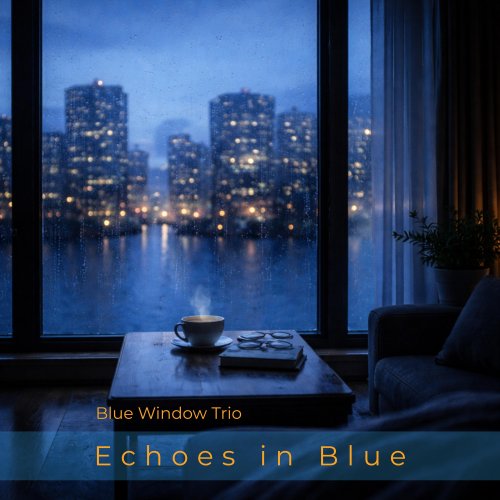The Oregon Symphony, Carlos Kalmar - This England - Britten / Elgar / Vaughan Williams (2015) [DSD64]

Artist: The Oregon Symphony, Carlos Kalmar
Title: This England - Britten / Elgar / Vaughan Williams
Year Of Release: 2015
Label: PentaTone
Genre: Classics
Quality: DSD64 2.0 (*.dsf) (tracks) 2,8 MHz/1 Bit
Total Time: 01:17:23
Total Size: 3.1 GB
WebSite: Album Preview
Tracklist:Title: This England - Britten / Elgar / Vaughan Williams
Year Of Release: 2015
Label: PentaTone
Genre: Classics
Quality: DSD64 2.0 (*.dsf) (tracks) 2,8 MHz/1 Bit
Total Time: 01:17:23
Total Size: 3.1 GB
WebSite: Album Preview
1. Cockaigne Overture (In London Town), Opus 40 15:04
2. Symphony No. 5 in D major Preludio- Moderato 11:57
3. Symphony No. 5 in D major Scherzo- Presto misterioso 05:12
4. Symphony No. 5 in D major Romanza- Lento 10:56
5. Symphony No. 5 in D major Passacaglia- Moderato 10:15
6. Four Sea Interludes and Passacaglia, Opus 33a Dawn- Lento e tranquillo 03:50
7. Four Sea Interludes and Passacaglia, Opus 33a Sunday morning- Allegro spiritoso 03:53
8. Four Sea Interludes and Passacaglia, Opus 33a Moonlight- Andante comodo e rubato 04:54
9. Four Sea Interludes and Passacaglia, Opus 33a Passacaglia 06:52
10. Four Sea Interludes and Passacaglia, Opus 33a Storm- Presto con fuoco 04:30
Sir Edward Elgar Cockaigne (In London Town), Opus 40
No one will ever suggest Sir Edward Elgar was an impressionist. But his Cockaigne overture is perfectly suited to the physical panoply of turn-of-the-century London, and full of loving description. In an emotional sense, the music adopts Brahms’ recipe for the Academic Festival Overture: boisterousness without slapstick; serenity without chill; yearning without loss. But the greater joy of listening to this music lies in sampling the urban energy of Elgar’s day and the newfound power Elgar brings to bear.
Ralph Vaughan Williams Symphony No. 5 in D major
Ralph Vaughan Williams Symphony No. 5 in D major The Vaughan Williams Fifth Symphony, composed between two far more violent works, is one of the most evocative pieces of music ever written – timelessly English, profoundly and gently sincere. It floats in upon the listener with soft motto horn calls, as if from a modal dream peopled with chords of smoke and fugues of fog. It inhabits a world of indistinct shapes moving through blacked-out streets, shadowy church gardens in the moonlight, and harbor mists. Yet no menacing or tragic vista is revealed in what Vaughan Williams depicts. Through everything muted and uncertain in 1943 wartime England, one senses only a deep reverence for beauty and the human heart. This is a work of cherished normality.
Benjamin Britten “Four Sea Interludes” and “Passacaglia” from Peter Grimes, Opus 33a and 33b
The ocean’s mystery and undertow have ideally suited music. And this has seldom been more the case than in a maritime nation like Britain. Think of Vaughan Williams’ A Sea Symphony, Elgar’s Sea Pictures, or Delius’ Sea Drift, each a metaphysical work finding in the lives of mariners, or in “the sea itself” and its creatures, a symbolic rendering of the human condition. So it is no surprise that Benjamin Britten would turn to the North Sea waves of his native Suffolk for the ground-breaking and disturbing 1945 opera, Peter Grimes.
No one will ever suggest Sir Edward Elgar was an impressionist. But his Cockaigne overture is perfectly suited to the physical panoply of turn-of-the-century London, and full of loving description. In an emotional sense, the music adopts Brahms’ recipe for the Academic Festival Overture: boisterousness without slapstick; serenity without chill; yearning without loss. But the greater joy of listening to this music lies in sampling the urban energy of Elgar’s day and the newfound power Elgar brings to bear.
Ralph Vaughan Williams Symphony No. 5 in D major
Ralph Vaughan Williams Symphony No. 5 in D major The Vaughan Williams Fifth Symphony, composed between two far more violent works, is one of the most evocative pieces of music ever written – timelessly English, profoundly and gently sincere. It floats in upon the listener with soft motto horn calls, as if from a modal dream peopled with chords of smoke and fugues of fog. It inhabits a world of indistinct shapes moving through blacked-out streets, shadowy church gardens in the moonlight, and harbor mists. Yet no menacing or tragic vista is revealed in what Vaughan Williams depicts. Through everything muted and uncertain in 1943 wartime England, one senses only a deep reverence for beauty and the human heart. This is a work of cherished normality.
Benjamin Britten “Four Sea Interludes” and “Passacaglia” from Peter Grimes, Opus 33a and 33b
The ocean’s mystery and undertow have ideally suited music. And this has seldom been more the case than in a maritime nation like Britain. Think of Vaughan Williams’ A Sea Symphony, Elgar’s Sea Pictures, or Delius’ Sea Drift, each a metaphysical work finding in the lives of mariners, or in “the sea itself” and its creatures, a symbolic rendering of the human condition. So it is no surprise that Benjamin Britten would turn to the North Sea waves of his native Suffolk for the ground-breaking and disturbing 1945 opera, Peter Grimes.

![Nicole McCabe - Color Theory (2026) [Hi-Res] Nicole McCabe - Color Theory (2026) [Hi-Res]](https://www.dibpic.com/uploads/posts/2026-02/1771327761_folder.jpg)


![Martin Fabricius & Chris Lavender - The Speed of Why (2010) [Hi-Res] Martin Fabricius & Chris Lavender - The Speed of Why (2010) [Hi-Res]](https://www.dibpic.com/uploads/posts/2026-02/1771254824_cover.jpg)

![Manu Delago & Max ZT - Deuce (2026) [Hi-Res] Manu Delago & Max ZT - Deuce (2026) [Hi-Res]](https://img.israbox.com/img/2026-02/19/v5s18xsisjkqnsg5od9qlgck5.jpg)
![Emanuele Pellegrini - Stories of Light and Dark (2026) [Hi-Res] Emanuele Pellegrini - Stories of Light and Dark (2026) [Hi-Res]](https://www.dibpic.com/uploads/posts/2026-02/1771347677_folder.jpg)
![Gonzalo Mazzutti - Lo que nos une (2026) [Hi-Res] Gonzalo Mazzutti - Lo que nos une (2026) [Hi-Res]](https://www.dibpic.com/uploads/posts/2026-02/1771563491_cover.jpg)